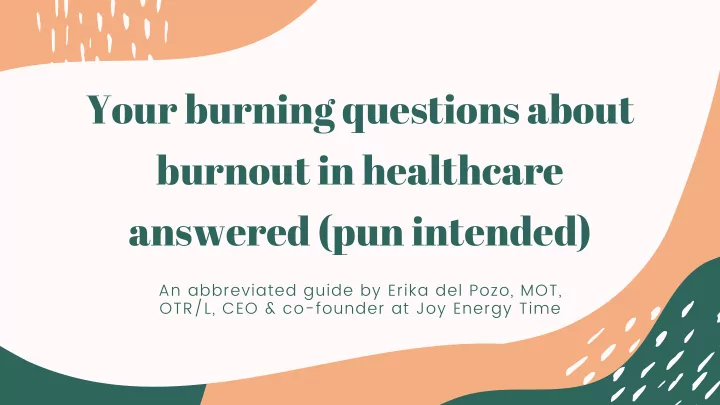

Your burning questions about burnout in healthcare answered (pun intended) An abbreviated guide by Erika del Pozo, MOT, OTR/L, CEO & co-founder at Joy Energy Time
What is burnout? Burnout is a psychological syndrome that involves a prolonged response to chronic stressors on the job. Burnout comprises of three key ingredients: emotional exhaustion, increased cynicism, and decreased self-efficacy. Burnout is more than just a few bad days at work here and there. The onset of acute fatigue from work stressors over time becomes the pivotal point in the burnout picture.
Is burnout the result of a personal failing? No. Although personality factors can play a role in the development of burnout, the problem is rooted in the work environment and care delivery system. Unfortunately, the term has gotten a bad rep because it has been believed that experiencing burnout means you're weak or you've failed in some way.
What causes burnout? The core factors include an unmanageable workload, decreased autonomy, insufficient rewards, broken community, value conflicts, and injustice/unfairness/lack of respect. Some other things include time demands, juggling clinical and nonclinical duties, documentation demands, and lowered morale over bureaucratic delays.
Can burnout happen even if I love my job? Many of us think burnout can’t happen to us because we love our field. Burnout begins with someone that is eager that enters the workforce with positive expectations to succeed. What happens with burnout is that positive qualities erode and turn into feelings of exhaustion, depletion, irritability, cynicism, ineffectiveness, low ability to cope, and failure.
What about outside of work? There is a bidirectional relationship between burnout and insomnia. Exposure to chronic work stressors without opportunities for recovery can facilitate the rate of burnout because there is a depletion of resources. Those that are burned out and also experience sleep disturbances are further hindered from replenishing their resources. Thus, the impact of burnout spills over into other areas of life.
Why is burnout still taboo? That's a good question. The cynicism associated with burnout is taboo- talking about how distant you feel from your patients and/or your profession to your colleagues isn't usually well received. Depersonalization has been linked to low professionalism in a systematic review of physician burnout.
Does workplace bullying impact burnout? Yes. Workplace bullying is considered to be a major work stressor, bringing forth destructive consequences for employees who are the targets of bullying, including severe depression and anxiety. The experience of injustice at work has a strong association with the exhaustion and cynicism components of burnout.
Yes and no. Can self-care Self-care will not fix the root of the help? problem, but taking care of your mental, spiritual, and physical health is always a good idea. There are hundreds of studies that have concluded that the benefits of personal strategies (i.e. meditation, mindfulness, self-compassion, exercise, etc.) can reduce the exhaustion, cynicism, and efficacy associated with burnout.
What can be done to address this problem? To start: #1 People and organizations need to acknowledge burnout for what it is. #2 Organizations must embrace a growth mindset and work on solutions. #3 Ditch the passed-down culture of discrimination, bullying, and silence and rebuild a culture of inclusion, collaboration, and community.
EXPERTS PREDICT THAT IF LEFT UNADDRESSED, BURNOUT WILL FURTHER ERODE THE MENTAL HEALTH OF DOCTORS AND RADICALLY UNDERMINE PATIENT CARE. Robert Pearl, MD
Liked this presentation? Visit our website. WWW.JOYENERGYTIME.COM
... and listen to The Burnt Out to Lit Up Podcast.
Let's Connect EMAIL info@joyenergytime.com LINKEDIN linkedin.com/in/erikadelpozo INSTAGRAM @joy.energy.time TWITTER @joyenergytime @erika_delpozo
Maslach, C., & Leiter, M.P. (2017). Understanding Burnout. In C.L. Cooper & J. CampbellQuick (Eds.), The Handbook of stress and health: A guide to research and practice (36-56). Hoboken, NJ: Wiley Blackwell Toker, S., & Melamed, S. (2017). Stress, Recovery, Sleep, and Burnout. In C.L. Cooper& J. Campbell Quick (Eds.), The Handbook of stress and health: A guide toresearch and practice (168-185). Hoboken, NJ: Wiley Blackwell Toker, S., & Melamed, S. (2017). Stress, Recovery, Sleep, and Burnout. In C.L. Cooper& J. Campbell Quick (Eds.), The Handbook of stress and health: A guide toresearch and practice (168-185). Hoboken, NJ: Wiley Blackwell Shanafelt, T.D., Noseworthy, J.H. (2017) Executive leadership and physician well-being:Nine organizational strategies to promote engagement and reduce burnout. Mayo Clinic Proceedings. 2(1):129-146.http://dx.doi.org/10.1016/j.mayocp.2016.10.004 Panagioti, M., Geraghty, K., Johnson, J., Zhou, A., Panagopoulou, E., Chew-Graham,C., Peters, D., Hodkinson, A., Riley, R., & Esmail, A. (2018). Association betweenphysician burnout and patient safety, professionalism,and patient satisfaction: A systematic review and meta-analysis. JAMA Intern Med. doi:10.1001/jamainternmed.2018.3713 Dyrbye, L.N., T.D. Shanafelt, C.A. Sinsky, P.F. Cipriano, J. Bhatt, A. Ommaya, C.P. West,and D. Meyers. (2017). Burnout among health care professionals: A call to explore and address this underrecognized threat to safe, high-quality care. NAM Perspectives. Discussion Paper, National Academy of Medicine, Washington, DC. https://nam.edu/Burnout-Among-Health-Care- Professionals. References Brand, S.L., Thompson Coon, J., Fleming, L.E., Carroll, L., Bethel, A., Wyatt, K. (2017) Whole-system approaches to improving the health and wellbeing ofhealthcare workers:A systematic review. PLoS ONE12(12):e0188418.https://doi.org/10.1371/ journal.pone.0188418
Recommend
More recommend